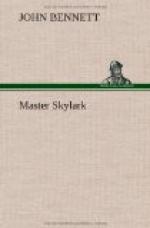“Now, Nick,” said Carew, coming up all in a gale, and throwing a sky-blue silken cloak about Nick’s shoulders, “thou’lt enter here”; and he led him to a hallway door just opposite the gates. “When Master Whitelaw, as the Duke, calls out, ’How now, who comes?—I’ll match him for the ale!’ be quickly in and answer to thy part; and, marry, boy, don’t miss thy cues, or—tsst, thy head’s not worth a peascod!” With that he clapped his hand upon his poniard and glared into Nick’s eyes, as if to look clear through to the back of the boy’s wits. Nick heard his white teeth grind, and was all at once very much afraid of him, for he did indeed look dreadful.
So Nicholas Attwood stood by the entry door, with his heart in his throat, waiting his turn.
He could hear the pages in the courtyard outside shouting for stools for their masters, and squabbling over the best places upon the stage. Then the gates creaked, and there came a wild rush of feet and a great crying out as the ’prentices and burghers trooped into the inn-yard, pushing and crowding for places near the stage. Those who had the money bawled aloud for farthing stools. The rest stood jostling in a wrangling crowd upon the ground, while up and down a girl’s shrill voice went all the time, crying high, “Cherry ripe, cherry ripe! Who’ll buy my sweet May cherries?”
Then there was another shout, and a rattling tread of feet along the wooden balconies that ran around the walls of the inn-yard, and cries from the apprentices below: “Good-day, fair Master Harrington! Good-day, Sir Thomas Parkes! Good-day, sweet Mistress Nettleby and Master Nettleby! Good-day, good-day, good-day!” for the richer folk were coming in at twopence each, and all the galleries were full. And then he heard the baker’s boy with sugared cakes and ginger-nuts go stamping up the stairs.
The musicians in the balcony overhead were tuning up. There was a flute, a viol, a gittern, a fiddle, and a drum; and behind the curtain, just outside the door, Nick could hear the master-player’s low voice giving hasty orders to the others.
So he said his lines all over to himself, and cleared his throat. Then on a sudden a shutter opened high above the orchestra, a trumpet blared, the kettledrum crashed, and he heard a loud voice shout:
“Good citizens of Coventry, and high-born gentles all: know ye now that we, the players of the company of His Grace, Charles, Lord Howard, High Admiral of England, Ireland, Wales, Calais, and Boulogne, the marches of Normandy, Gascony, and Aquitaine, Captain-General of the Navy and the Seas of Her Gracious Majesty the Queen—”
At that the crowd in the courtyard cheered and cheered again.
“—will, with your kind permission, play forthwith the laughable comedy of ‘The Three Grey Gowns,’ by Master Thomas Heywood, in which will be spoken many good things, old and new, and a brand-new song will be sung. Now, hearken all—the play begins!”




